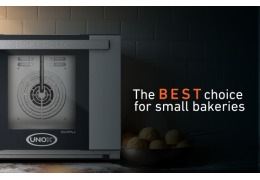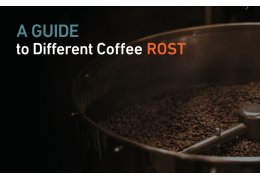In the bustling world of bakeries and restaurants, commercial foodservice equipment plays a crucial role in the...
The Guide to Commercial Ovens: Features, Benefits, and How to Choose the Best One for Your Business
If you run a food service business, you know how important it is to have reliable and efficient equipment. One of the most essential pieces of equipment for any commercial kitchen is the oven. Commercial ovens come in a variety of types and sizes, each with unique features that can help you cook your dishes to perfection. In this post, we'll provide a comprehensive guide to commercial ovens, including the different types, key features to look for, and tips for maintenance and troubleshooting.
Introduction
Why are commercial ovens essential for food service businesses ?
Commercial ovens are essential for food service businesses because they allow for efficient and consistent cooking of large quantities of food. Unlike home ovens, commercial ovens are designed to handle high volumes of food and can withstand frequent use without breaking down. They come in a variety of types and sizes, each with unique features that can help you cook your dishes to perfection. Commercial ovens also have faster cooking times, which is essential for businesses that need to serve customers quickly. They are a critical component of any commercial kitchen and can help businesses increase their productivity, reduce their labor costs, and improve the quality of their food.
Types of Commercial Ovens
Commercial ovens come in a variety of types, each with unique features that can help you cook your dishes to perfection. Here are the three most common types of commercial ovens:
1. Convection Ovens:
Convection ovens use a fan to circulate hot air around the food, which results in even cooking and faster cooking times. They are ideal for cooking a variety of dishes, including baked goods, roasted meats, and vegetables. Convection ovens come in both gas and electric models, and they are available in a range of sizes to suit different business needs.
2. Deck Ovens:
Deck ovens are designed to mimic the traditional brick oven, which results in a unique, crispy crust on pizzas and bread. They use stone or ceramic decks to provide even heat distribution, and they can be stacked to save space in the kitchen. Deck ovens are typically gas-powered and are available in a range of sizes.
3. Conveyor Ovens:
Conveyor ovens use a conveyor belt to move food through the oven, which allows for high volume output and consistent cooking times. They are ideal for cooking pizzas, sandwiches, and other foods that require a lot of space. Conveyor ovens are typically electric-powered and are available in a range of sizes to suit different business needs.
Other types of commercial ovens include combi ovens (which combine convection and steam cooking), rotisserie ovens (which are designed for cooking large cuts of meat), and microwave ovens (which are ideal for reheating food quickly). When choosing a commercial oven, it's important to consider the types of dishes you'll be cooking and the volume of food you'll need to produce.
What criteria do you use to choose a commercial oven?
When selecting a commercial oven, there are several key features to consider. Here are some of the most important ones
1. Size:
The size of the oven should be based on the volume of food you need to produce. Consider the size of your kitchen and the available space for the oven.
2. Power Source:
Commercial ovens are available in both gas and electric models. Gas ovens are typically more energy-efficient and provide faster heating, while electric ovens are easier to install and maintain.
3. Cooking Speed:
The cooking speed of the oven is an important consideration for businesses that need to serve customers quickly. Convection ovens are typically faster than other types of ovens.
4. Temperature Range:
The temperature range of the oven should be suitable for the types of dishes you'll be cooking. Some ovens have a wider range of temperatures than others.
5. Controls:
The controls of the oven should be easy to use and allow for precise temperature and time settings.
6. Energy Efficiency:
Energy-efficient ovens can help businesses save money on their utility bills. Look for ovens with high Energy Star ratings.
7. Durability:
Commercial ovens should be made of high-quality materials that can withstand frequent use without breaking down.
8. Ventilation:
Proper ventilation is essential for commercial ovens to prevent overheating and ensure safety in the kitchen.
9. Cleaning and Maintenance:
The oven should be easy to clean and maintain to ensure that it operates efficiently and lasts for a long time.
Considering these key features will help you select the best commercial oven for your business needs.
Maintenance and Troubleshooting Tips
Tips for maintaining and cleaning commercial ovens
Such as regular inspections, proper ventilation, and cleaning schedules.
Maintaining and cleaning commercial ovens is essential to ensure that they operate efficiently and last for a long time. Here are some practical tips for maintaining and cleaning commercial ovens:
1. Regular Inspections
Inspect the oven regularly to ensure that all parts are in good working order. Check the door gaskets, heating elements, and other components for signs of wear and tear.
2. Proper Ventilation
Proper ventilation is essential for commercial ovens to prevent overheating and ensure safety in the kitchen. Make sure that the ventilation system is working properly and that the oven is not located near combustible materials.
3. Cleaning Schedules
Establish a regular cleaning schedule for the oven. Clean the oven after each use, and perform a deep cleaning at least once a month. Use a commercial oven cleaner and follow the manufacturer's instructions.
4. Door Gaskets
Clean the door gaskets regularly to prevent food particles and debris from getting trapped. Replace the gaskets if they are damaged or worn.
5. Heating Elements
Clean the heating elements regularly to prevent a buildup of grease and debris. Use a soft brush or cloth to remove any buildup.
6. Burners
Clean the burners regularly to ensure that they are working efficiently. Use a soft brush or cloth to remove any buildup.
7. Filters
Clean or replace the filters regularly to ensure that the ventilation system is working properly.
8. Professional Maintenance
Schedule regular maintenance with a professional service technician to ensure that the oven is operating at peak efficiency.
By following these practical tips, you can ensure that your commercial oven operates efficiently and lasts for a long time.
How to troubleshoot common problems ?
advice on how to troubleshoot common problems, such as uneven cooking, overheating, and malfunctioning parts
Commercial ovens can experience a variety of problems that can affect their performance. Here are some tips for troubleshooting common problems with commercial ovens:
1. Uneven Cooking
If the oven is cooking food unevenly, it may be due to a problem with the heating elements or the fan. Check the heating elements to ensure that they are working properly and that they are not covered in grease or debris. Check the fan to ensure that it is working properly and that it is not obstructed.
2. Overheating
If the oven is overheating, it may be due to a problem with the thermostat or the temperature sensor. Check the thermostat to ensure that it is working properly and that it is set to the correct temperature. Check the temperature sensor to ensure that it is not damaged or malfunctioning.
3. Malfunctioning Parts
If a part of the oven is not working properly, it may need to be replaced. Check the owner's manual for instructions on how to replace the part. If you are unsure how to replace the part, contact a professional service technician for assistance.
4. Burned or Undercooked Food
If the food is being burned or undercooked, it may be due to a problem with the cooking time or temperature. Check the cooking time and temperature to ensure that they are set correctly. Adjust the settings as needed.
5. Excessive Smoke
If the oven is producing excessive smoke, it may be due to a buildup of grease or debris. Clean the oven thoroughly to remove any buildup.
If you are unable to troubleshoot the problem on your own, contact a professional service technician for assistance. They can diagnose the problem and provide recommendations for repairs or replacement parts.
Conclusion
Selecting the right commercial oven is essential for any business that relies on cooking or baking. When choosing a commercial oven, it's important to consider factors such as size, power source, cooking speed, temperature range, controls, energy efficiency, durability, ventilation, and cleaning and maintenance. Regular inspections, proper ventilation, and cleaning schedules are also important to ensure that the oven operates efficiently and lasts for a long time. Troubleshooting common problems such as uneven cooking, overheating, and malfunctioning parts requires knowledge of the oven's components and operation, and professional assistance may be necessary. Overall, selecting the right commercial oven for your business needs is crucial for efficient and high-quality cooking and baking.
If you're looking for a high-quality commercial oven for your business, be sure to check out mkayn. We offer a wide selection of commercial ovens to fit your needs, including gas and electric models, convection ovens, and more. Our knowledgeable staff can help you find the perfect oven for your business, and we offer competitive pricing and excellent customer service. Don't settle for a subpar oven - visit mkayn today and discover the best fit for your business!
.png)







Leave a comment